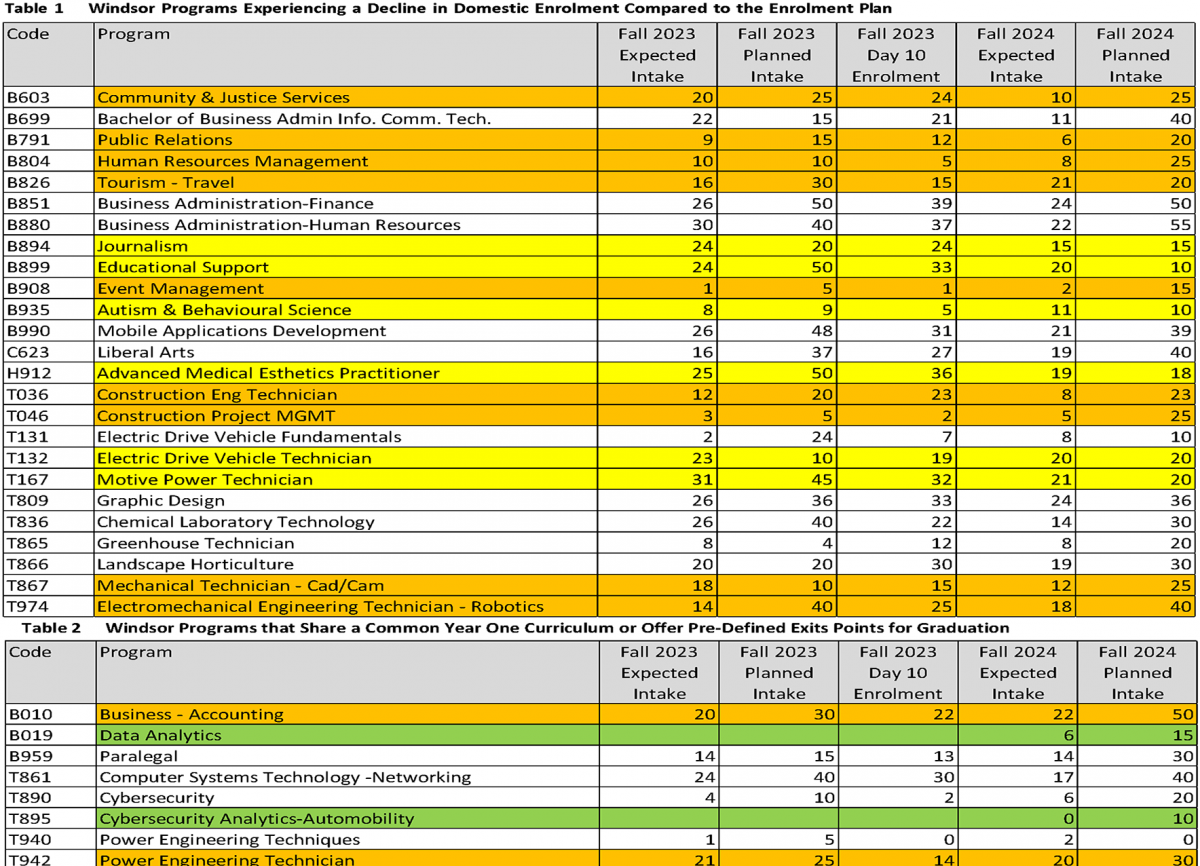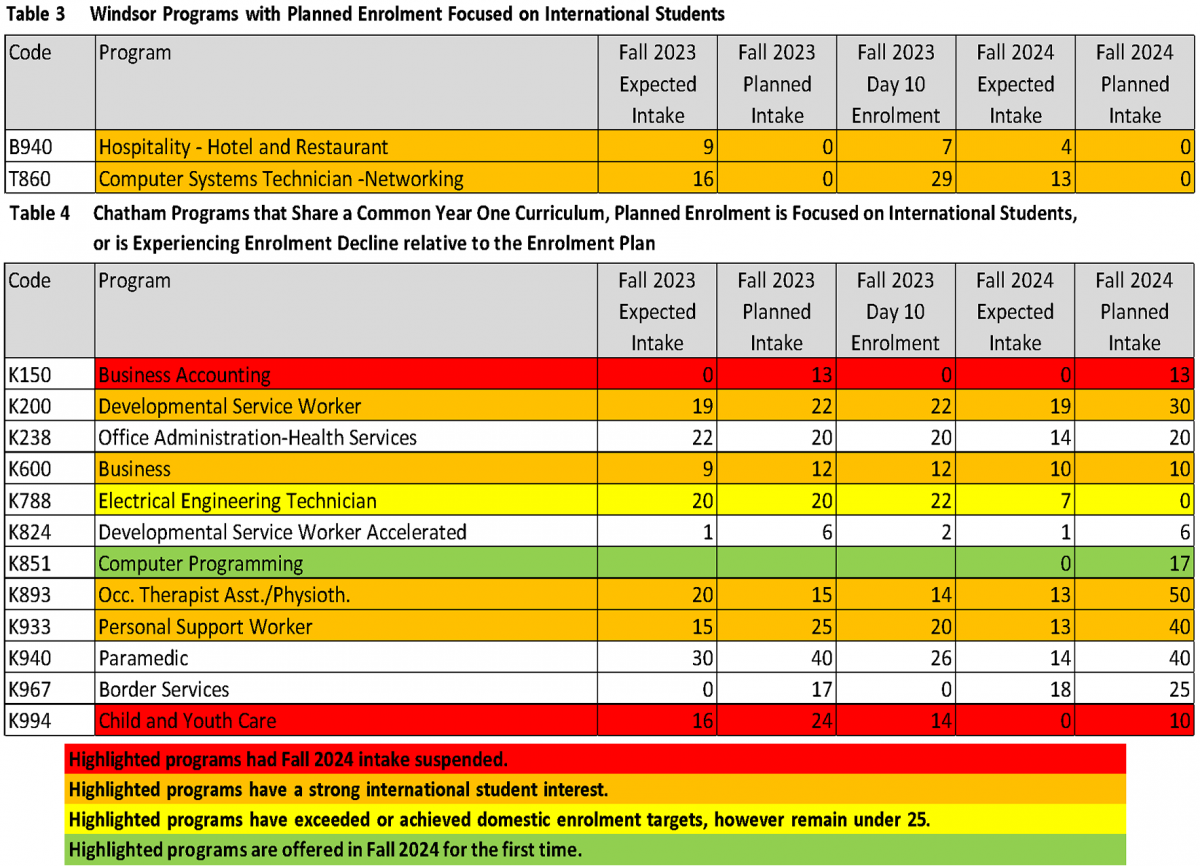
Upon the recommendation of the college’s administration, 16 programs that are currently exhibiting sparse interest on the part of prospective students had their first-year intake suspended by the college’s Board of Governors during its June 25th meeting.
The report to the Board was furnished by President Michael Silvaggi, Senior Vice-President of Finance and Administration Marc Jones, and Senior Vice-President Academic and Career Supports Monica Staley Liang.
It noted that the college keeps a close eye on applications to all programs throughout the spring, with a heightened concentration between May 1 (the deadline for applicants to confirm their programs of choice) and June 13 (when a determination must be made about the financial feasibility of allocating staffing and classroom resources to what may be severely under-enrolled programs).
The 16 programs that did not prove to be very popular with incoming students this year – and which, therefore, have had their intakes suspended for the fall semester – are:
At Windsor Campuses: Media Convergence (a hybrid of various forms of journalism), General Arts and Science, Mechanical Techniques–Precision Metal Cutting, Power Engineering Technology;
At Chatham Campus: Office Administration–Executive, Child and Youth Care–Accelerated, Data Analytics, Computer Programming; and
At St. Clair’s “sister school” with the private Ace Acumen Academy in the Greater Toronto Area: all of the college programs currently offered there – Business, Computer Systems Technician–Networking, Data Analytics for Business, Human Resources Management, International Business Management–Logistics Systems, Office Administration–Health Services, Public Relations, Social Service Worker–Gerontology, Strategic Project Management.
All of the programs at Ace Acumen Academy are being phased out due to the federal/provincial-ordered “pause” on international student immigration that was introduced in January. Included in that two-years-long re-evaluation of Canada’s ability to accommodate large numbers of international students was the federal government’s decision to, now, deny post-graduation work-permits to students enrolled at public-private college partnerships. It is believed that the loss of the attractive work permit will mean that applications to such paired colleges will completely evaporate.
Suspending programs in this manner does not mean that they are permanently cancelled. Second- and third-year students who are currently enrolled in the programs will be allowed to complete them. Additionally, if a feasible level of applications by new prospective students materializes in the next semester (or within a year or two), these temporarily suspended programs can be re-activated in fairly rapid fashion.
The Silvaggi/Jones/Staley Liang report to the Board also provided information about programs “whose Year One domestic student intake for the Fall 2024 semester will not be suspended, but which do – as of June 13 – have an expected intake of less than 25 domestic students.”
This information is provided every year to emphasize to the Board the precarious enrolment situation of some programs – that are suffering from the historically low local birth-rate (not enough domestic teenagers emerging from high schools), and/or that are inordinately benefiting from high international student enrolment.
Here are the graphs associated with that portion of the report:


INTERNATIONAL: GOOD NEWS AND BAD NEWS
As for the projected enrolment situation for international students during the coming academic year, the administration portrayed that as a ”good news/bad news” dichotomy.
Silvaggi told the Board that the federal government still has yet to confirm its plans regarding the ongoing issuance/duration of Post-Graduate Work Permits (PGWPs) for international students: whether that pathway to residency/citizenship will continue to be made available to all international grads, and how many years such permits will cover.
The PGWPs have been a major incentive for prospective global applicants, Silvaggi noted, and the current uncertainty about the federal government’s plans has slowed the admissions and visa application process – especially among Indian students. (Other political tensions between Canada and India are also complicating that situation.)
The federal government has announced that it will be surveying postsecondary institutions about the visa/PGWP process, and the importance of immigrants to local economies, in the near future. But it hasn't done so yet, Silvaggi added, nor firmed up its policy intentions. Meanwhile, the summer is zooming by, with prospective international applicants in a state of uncertain limbo.
On the ”good news” side of the equation, Senior Advisor to the President Ron Seguin said the fact that all of St. Clair’s international visa allocations haven't already been claimed by Indian students means that prospective enrollees from a large number of other nations are currently filing applications to the college.
Seguin said the school is also seeing a new wrinkle in the international application process: an increasing number of applicants are an avoiding an extra cost of their education by seeking their visas and filing their applications directly with the school - not using recruitment agents.
More good news from Seguin: Recent enrolment numbers show that St. Clair is in the Top Five postsecondary schools in Ontario for welcoming international students, and the top school in that regard outside of the Greater Toronto Area.
The administration wrapped up its report to the Board saying that it was confident that if the enrolment target for international students was not achieved during the fall semester, it was hopeful that it would have a full turn-out by the start of the winter semester in January. (Presumably the federal government will have its revised policies in place by then.)
NEW CHAIR AND VICE
The final Board meeting before its summer hiatus also saw the changing-of-the-guard of the organization’s hierarchy.
Jean Piccinato has completed her six-years-long appointment to the Board and now becomes its Past Chair. In addition to still being consulted about Board issues, she will also serve, now, as the delegate to the college’s fundraising Foundation.
Vice-Chair Gary Rossi has now stepped up to become the Board’s Chair, and Governor Charlie Hotham is the new Vice-Chair.
ALUMNI AND FOUNDATION UPDATES
During the meeting, also, the Board was updated about the Foundation’s and Alumni Association’s activities during the past year.
Helping to bolster the college’s ”brand”, the Alumni Association spent $250,000 in “community involvement” in 2023-24: event sponsorships, a presence at festivals, give-away, charity involvements.
It also funded “student life” experiences, activities and entertainment (and club projects and programs) to the tune of $50,000 at the Windsor and Chatham campuses, and $30,000 at Ace Acumen.
Alumni Association members - St. Clair’s grads - are enjoying a new ”Perks” program, with 3,600 signed-up participants utilizing discounts from almost 60 local merchants. Over 6,500 alumni have also turned out to the association’s dozen special activities so far during this calendar year.
Almost 9,000 new members joined the Association this past year after receiving their diplomas during Convocation ceremonies.
The Foundation, through its regular, long-standing program, issued 1,230 scholarships totalling $1.3 million during the past year.
Funding from the Board of Governors created the new Academic Excellence scholarships: $3.2 million went to 3,750 Saints.
The Board also funded new entrance scholarships: two apiece at every high school in southwestern Ontario, for $1,000 each.
The Foundation has a total portfolio investment of $25.4 million, which generated $555,000 in interest last year.
ANOTHER BOARD OF GOVERNORS STORY: https://news.stclair-src.org/need-know-news/college-doing-well-meeting-its-promises-province







